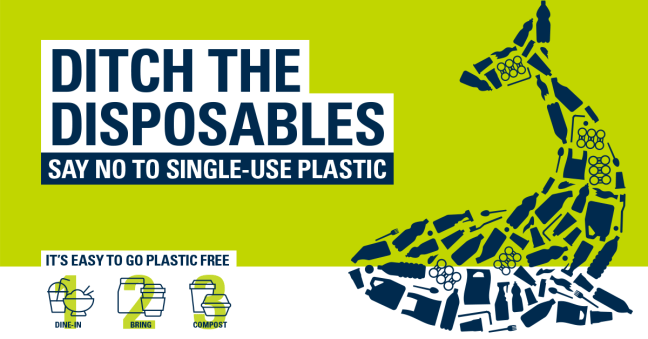
Plastic - it’s strong, it’s durable, it’s versatile. Impressive, right? Unfortunately, the majority of plastics are only used once before entering our waterways.
Plastic pollution has become one of the most pressing global environmental issues. According to National Geographic, the production of plastic has increased exponentially, from 2.3 million tonnes in 1950 to 448 million tonnes by 2015, and is expected to double by 2050.
The World Wide Fund for Nature (WWF) states that on average, Australians use 130kg of plastic per person, each year, and only 12 per cent of this is recyclable. Furthermore, plastic pollution contributes to the deaths of more than 100, 000 marine mammals every year, and 80 per cent of this is estimated to come from land-based sources.
But wait, there’s more. Plastic contamination is also now affecting our health. According to WWF, a recent Australian study has determined that globally, we are ingesting an average of five grams of plastic every week – the equivalent of a credit card.
The solution is to simply prevent plastic waste from entering our rivers and oceans in the first place. To achieve this, we need to work together.
The Aim
CQUniversity is not only working hard to educate staff and students on the harmful impacts of single-use plastic but also aims to lead by example. The University has embarked on a long-term sustainability journey and is working with particular areas to demonstrate its commitment to the environment.
Capricornia College: Phase out single-use plastic containers and implement a reusable container system. Introduce multi-use or composting catering containers.
Birdcage Bar: Launch a loan the container initiative or implement a bring-in container app. Only offer 100 per cent compostable single-use products for takeaway items.
Bookshop: Transition to plastic-free products and source eco-friendly compostable stationery products.
Community Sports Centre/ University Events: Stop single-use plastic products being used at University-organised sporting events (such as plastic water bottles). Transition to plastic-free products and source eco-friendly compostable stationery products.
Vending Machine: Transition from single-use plastic products to aluminium cans. Introduce a single-use plastic offset plan, while a more effective solution is found.
Purchasing/Finance and Planning Division: Reduce the amount of single-use plastic products that are purchased, through a modified purchasing policy. Try to consolidate orders to use less packing. Implement a stationary inventory so that items aren’t ordered unnecessarily.
How Can I Help?
To help you, help the environment, we’ve put together a range of engaging activities that will equip you with the knowledge and means to reduce your single-use plastic consumption.
Ditch the Disposables Social Media Campaign: In May 2020, reusable straws will be made available to you in common areas at all major CQUniversity campuses. You’re encouraged to use, snap and post a selfie, tag our official CQUniversity channels and use the #DitchTheDisposables hashtag. Let’s work together to help generate impactful conversations around single-use plastic.
Expert Information Sessions: Participate in one of our upcoming expert information sessions. CQUniversity has partnered with local councils in nominated regions to host tailored information sessions about how to recycle the right way.
- CQUniversity Perth: WATCH HERE
Simple Alternatives: In the meantime, forget the convenience of single-use plastic and opt for one of three simple alternatives; dine-in, bring your own or use compostables.
Stay tuned for campaign activity updates via your student email. And, remember, little changes will have a big impact.


